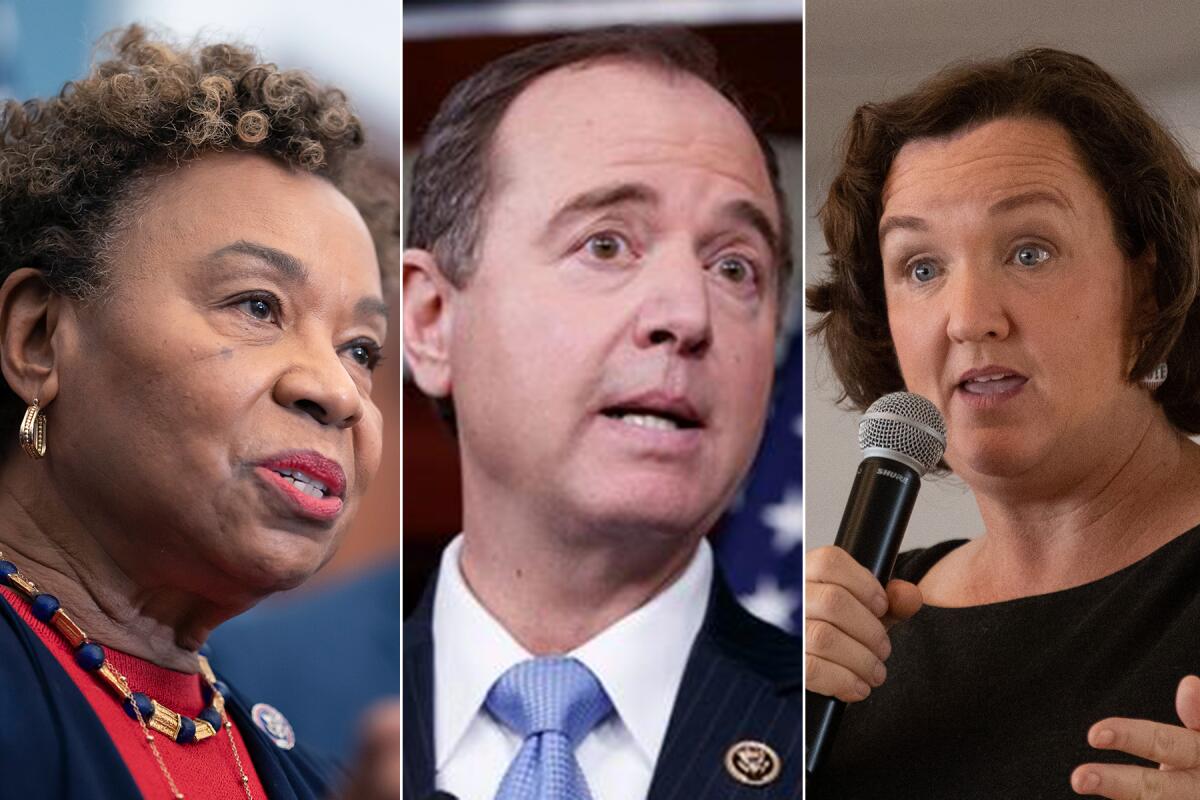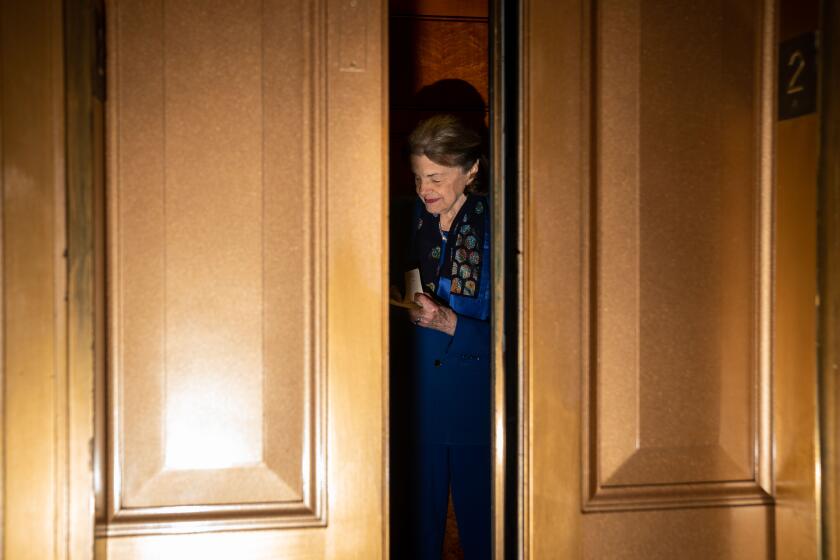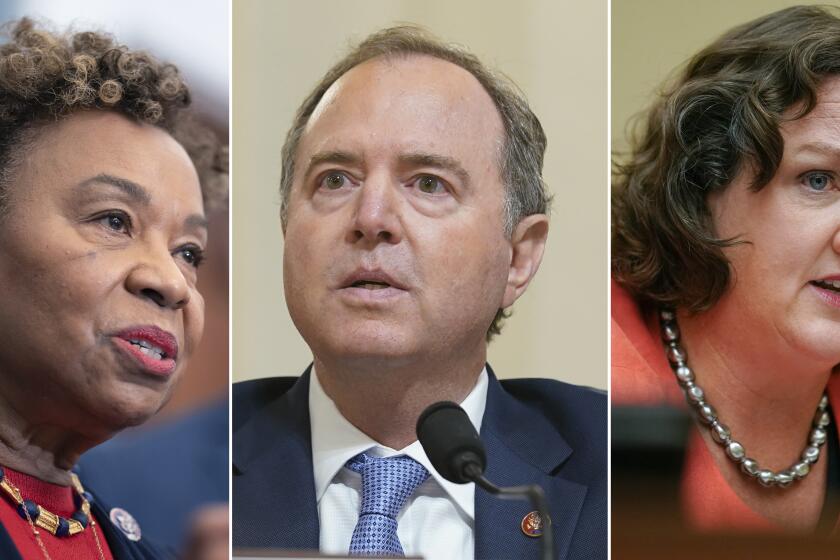Column: Trump tormentor, whiteboard wizard — it’s the brand that matters in California Senate race

- Share via
WALNUT CREEK, Calif. — When Adam B. Schiff recently brought his U.S. Senate campaign to Northern California, 500 people showed up for his stop at a 55-and-older community nestled in the green, rolling hills of the East Bay Area. Dozens more were turned away.
A few weeks earlier, Katie Porter drew a similar overflow crowd when she kicked off her bid to replace the retiring Sen. Dianne Feinstein with an appearance before the same Democratic audience.
The turnout suggests more than just keen interest in a primary that’s still close to a year off. It reflects a notable shift in California politics.
It used to be that House members like Schiff and Porter spent their days toiling in relative obscurity. Those who traveled just a few blocks outside their districts — much less the vast distance between points in California — were about as familiar as the anonymous attendant working the drive-through window at some random doughnut shop.
However, by the time Schiff and Porter arrived more than 350 miles from home to address the Rossmoor Democratic club, the largest in Northern California, they were both household names with well-established political brands: the Trump tormentor, the whiteboard wizard.
Neither was hindered by their personal geography — Schiff rooted in Burbank, Porter in Irvine — or their lack of a significant connection to the Bay Area. Their celebrity status — minted in viral videos, national TV appearances and countless clicks on social media — saw to that.
Sen. Dianne Feinstein is one of the most meaningful and accomplished lawmakers Californians ever put in office. She deserves to be remembered for more than her recent decline.
California has a very limited history of electing House members to the U.S. Senate. Just a handful have managed the feat since the direct election of U.S. senators began roughly a century ago.
In a lightly populated state such as Wyoming or Montana, with just a lone House member or two, “you’re a big deal as a congressperson,” said Bill Carrick, a longtime Feinstein strategist.
“But the more members of Congress there are, the tougher it is to move up the ladder,” Carrick said. “If you’re one of seven House members in South Carolina, it’s a challenge. If you’re one of 52 in California, it’s a challenge beyond comprehension.”
California‘s last House member to make it to the Senate was Barbara Boxer, in 1992, and the notion that the Marin County congresswoman could have launched her bid before 500 cheering and stomping Democrats in, say, Long Beach or Laguna Niguel, is utterly fantastical.
“When she started running, she knew almost no one in Southern California, and more importantly, they didn’t know her,” said Rose Kapolczynski, who ran Boxer’s long shot campaign. “She did months of meetings with political leaders and major donors, and finally got a core group of people who were excited about her, and did bigger events and started to become better-known.
“But that was a long retail politics project,” Kapolczynski said.
And it was a long time before the development of today’s political news ecosystem, with its star-making capacity and circulation beyond borders.
Voters are no longer “captive to a piece of media that shows up on their doorstep,” said Democratic strategist Jim Ross. “It’s all digital now, so a story in the San Francisco Chronicle might be read in Bakersfield. A piece in the L.A. Times can be read in Berkeley.”
More significantly, bottomless TV news coverage and the ability of viewers to share choice snippets on social media have turned voters into front-row spectators to the political dramas of the day and made heroes of the supporting cast.
“Our members were glued to the Jan. 6 hearings. They were glued to the impeachment hearings,” said Katha Hartley, chair of the Rossmoor Democrats’ speakers committee. “We’ve seen Adam Schiff do his thing. We’ve seen Katie Porter in action.”
Little wonder partisans met both with rousing ovations before they even said a word.
Democrats Katie Porter, Adam Schiff and Barbara Lee largely agree on issues. So how do they get voters to back their bids for retiring Sen. Dianne Feinstein’s seat?
Of course, there is another House member running for Feinstein’s seat: Oakland’s Barbara Lee. Her distinction as the sole candidate, so far, from Northern California could theoretically give her an advantage.
Four of California’s most recent U.S. senators — Boxer, Feinstein, Kamala Harris and Alan Cranston — and the state’s last two governors — Jerry Brown and Gavin Newsom — all had a background in Bay Area politics.
Democrats in the region tend to turn out in greater number than those elsewhere in the state, and historically they have shown greater preference for candidates from the north than the south.
Porter and Schiff promise to test that loyalty with their fame and dedicated followings, and Lee knows better than to take her home turf for granted. Soon after entering the race, the East Bay congresswoman ran into The Times’ Dakota Smith at Los Angeles City Hall. “I’m going for votes everywhere,” Lee told her.
She needs to. A recent Los Angeles Times poll showed Schiff and Porter both running ahead of Lee in the Bay Area.
It was just one poll, and it’s still very early in the contest. But clearly California is a different place than it was the last time a House member made the leap to the U.S. Senate.
More to Read
Get our L.A. Times Politics newsletter
The latest news, analysis and insights from our politics team.
You may occasionally receive promotional content from the Los Angeles Times.












